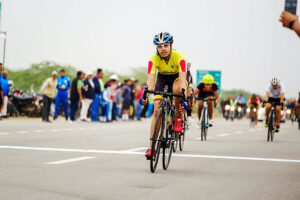Kolkata-based tennis coach Shivika Burman is shaping up the dreams of young players in India with a holistic approach

Taking up tennis at the age of 9, Shivika Burman has come a long way from her days in India’s national squad for the Asian Games team to becoming a sports entrepreneur. The Kolkata-based player—now in her early thirties—has plunged into the world of coaching and successfully runs the Tennis Tree, a tennis academy, nestled in the heart of the city of joy. Having faced the challenges of serious injuries herself, Shivika turned her attention towards nurturing young talents in a way that they could attain greater heights and not be bogged down by physical setbacks or lack of proper guidance and infrastructure to practice the sports.

She was introduced to the sport by father Satyajeet Burman. For her, tennis was a family priority. “My elder brother and I used to get trained in tennis together. Initially, we used to compete against each other. But, at the age of 13, I started competing in national and international tournaments. By the time I was 16, I knew I wanted to make a career out of this (tennis) and thus dropped out of school,” shared Shivika, who continued with her home-schooling to match up with the requirements of her tournament schedules. At the age of 19, she had turned pro. She won her first international title at 21.
Her share of professional highs includes her journey in the Fed Cup team with Sania Mirza. One of her major achievements was her win at the 10,000 $ international women’s singles tournament in Djibouti in 2011 and the 2016 doubles title in Egypt at the ITF Women’s Tennis Tournament.
Interestingly, she won the tournament in Egypt after coming back from a surgery. “Unfortunately, I had some major injuries. They are the part and parcel of a sportperson’s life. At the same time, they are the biggest nightmares. I had to deal with quite a few injuries during my journey. My back and shoulder injuries are the major ones. I underwent shoulder surgery in 2015. After this, I wasn’t confident of a comeback. However, I worked a lot on my rehab and strengthening exercises and won the professional tournament in Egypt,” she recalled, urging young players to focus on injury prevention. “Give more importance to warm exercises and recovery routine. When you are young, you have a lot of energy and you tend to overdo things without realizing the consequences. So, focus on injury prevention and strengthening and conditioning training,” she further advised.

Burman was also the only player to be ranked internationally since she started playing juniors and later women’s tennis. As per reports, it was getting difficult for her to travel alone without the support of any mentor or coach to contest at the international level. It was then that she started toying the idea of starting a coaching academy. “Tennis is such a big passion for me that I always knew that even after I stopped playing the sport professionally, I would want to get into coaching and start something in my city. So, I started the academy with my friend Farid in Kolkata, where we help kids not only to develop their tennis skills but also their life skills. We have laid special emphasis on their holistic development,” shared Shivika, who runs two centres with about 200 children. Last year, she travelled with the Indian Under-12 team as the captain. The team won a silver medal. This year, she coached a player at the US Open.
Speaking about the several challenges faced by the majority of Indian players, Shivika said often financial constraints and lack of economical support turn out to be the key hurdles. “It gets very difficult for the kids to travel alone, without the support of any coach or physio,” she added. But, patience and perseverance pays off, the coach in her firmly believes and propagates the same notion. “You also need to have motivation. You can be a talented player but you need to be motivated well to take on tough challenges. It is also equally important to stay focused as well as enjoy the process,” she said, urging all sports persons to be 100 percent committed to the cause.




